The 2nd edition of the
Habitat International Film Festival, 2018 (HIFF-2018) is back with a stunning line up of World Cinema! A wonderful selection of new, lauded, critically acclaimed films of 2017 and award winning films of 2016 awaits you this time. Features, shorts and documentaries, HIFF brings you the best of World Cinema. The First HIFF held in March 2017 was very successful and was both widely attended and well appreciated.
Schedule for German films in the festival:
 © Pandora Film. Martin Menke
Sunday, 25 March, 16:00, Stein Auditorium:
© Pandora Film. Martin Menke
Sunday, 25 March, 16:00, Stein Auditorium:
Paula (Directed by: Christian Schwochow, Germany/France, colour, 123 min., 2015/2016, German)
In 1900, budding artist Paula Becker‘s options are limited. The exuberant 24-year-old woman could become a wife or find work as a governess or teacher. Although painting is not an acceptable vocation for a woman in her provincial Germany, she is permitted to study at the Worpswede artists‘colony under the tutelage of Fritz Mackensen. Frustrated with precision and accuracy, she risks letting her emotions guide her brush, and she boldly turns to village peasants as subjects. Paula flourishes in the countryside artistic community, where she develops close friendships with artist Clara Westhoff and poet Rainer Maria Rilke.
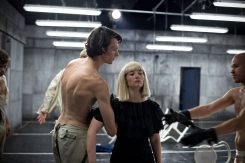 © TeamWorxX Television und Film GmbH
Monday, 26 March, 18:30, Gulmohar Hall:
© TeamWorxX Television und Film GmbH
Monday, 26 March, 18:30, Gulmohar Hall:
Cracks in the Shell (Directed by: Christian Schwochow, Germany, colour, 113 min., 2010/2011, German)
Fine Lorenz, a drama student, dreams of a stage career. Given the fact that she’s a wallflower, she would not have stood a chance, had Kaspar Friedmann not taken notice of her. Perhaps this is exactly what the prominent director liked about her: Fine is a blank slate, malleable and willing to change her identity for a big role, and thus sacrifice her own personality. Under the director's pressure, the more willing Fine is to identify with her character, the riskier the game becomes. Her self-abandonment brings the young actress close to the brink of disaster.
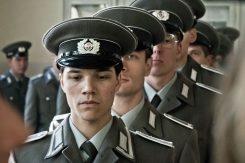 © Nik Konietzny
Tuesday, 27 March, 18:30, Gulmohar Hall:
The Tower
© Nik Konietzny
Tuesday, 27 March, 18:30, Gulmohar Hall:
The Tower (Directed by: Christian Schwochow, Germany, colour, 180 min., 2011/2012, German)
A family saga set during the final years of the GDR. Surgeon Richard Hoffmann may have come to an opportunistic arrangement with the system a long time ago, but his way of life enables state security officials to blackmail him. Richard’s son Christian manages to pass his final secondary school exams despite a number of conflicts and goes through a tough and eventful time after joining the National People’s Army. His uncle Meno is an editor and struggles, at times only half-heartedly, against the parameters set by state censorship. The fall of the Wall in November 1989 seems to be felt as a salvation by the protagonists. The adaptation of
Uwe Tellkamp’s novel of the same name does away with the epic scope of the written original, but was considered one of the best things to come out of German TV in 2012.
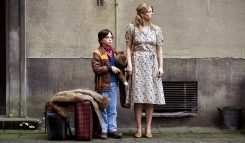 © Frank Dicks/ zero one film
Wednesday, 28 March, 18:30, Gulmohar Hall:
© Frank Dicks/ zero one film
Wednesday, 28 March, 18:30, Gulmohar Hall:
West (Directed by: Christian Schwochow, Germany, colour, 98 min., 2012/2013, German)
The summer of 1978: Nelly Senff, a postgraduate chemist, and her son Alexej relocate from East to West Berlin. A feigned marriage to a West German has made the move possible. After the death of Nelly's boyfriend and Alexej's father, she hopes to start a new life in the West. But first, the two end up in a refugee centre, and the German bureaucracy, with its string of questionnaires, is not the only thing that racks their nerves. The Secret Service, and most of all the CIA, are very interested in the reasons for Nelly's exit from East Berlin – and even more so in her presumed dead boyfriend Wassilij, who may be operating as an agent on both fronts. To secure a future, the woman must first put the past behind her.
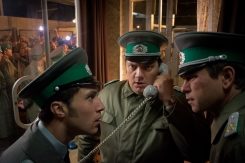 © ARD UfaFiction Nik Konietzy
Thursday, 29 March, 21:00, Stein Auditorium:
© ARD UfaFiction Nik Konietzy
Thursday, 29 March, 21:00, Stein Auditorium:
Bornholmer Straße (Directed by: Christian Schwochow, Germany, colour, 88 min., 2014, German)
9 November, 1989: At the Bornholmer Straße border checkpoint in Berlin, GDR soldiers and customs officers are shocked by an announcement made by Günter Schabowski, member of the Central Committee of the Politburo of the SED, as he reveals in a press conference, broadcast live on television, that all East German citizens will be allowed to cross into the West. Many people are caught up in the euphoria – and not realising that they still require a passport and visa, head straight to their nearest checkpoint. Lieutenant Colonel Schäfer and his men still haven’t realised what will be in store for them later that evening. It ends with the border being opened – the beginning of the end for the GDR. BORNHOLMER STRASSE is a magnificently ironic and astonishingly moving comedy about hope meeting despair and heroes who have no desire to be such.
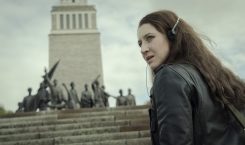 © Stephan Rabold
Friday, 30 March, 14:00, Stein Auditorium:
© Stephan Rabold
Friday, 30 March, 14:00, Stein Auditorium:
In The Middle Of Germany: NSU – “The Perpetrators – Today Is Not The End” (Directed by: Christian Schwochow, Germany, colour, 95 min., 2015/2016, German)
Jena, 1990: Young people have few prospects, and nor does Beate Zschäpe, who’s caught under the spell of right wing extremists and has thus got to know Uwe Mundlos and Uwe Böhnhardt. The three develop a tight-knit community - with murderous plans.
 © 2017 Non-Stop Productions – Why Not Productions
Saturday, 31 March, 21:00, Stein Auditorium:
© 2017 Non-Stop Productions – Why Not Productions
Saturday, 31 March, 21:00, Stein Auditorium:
Loveless (Directed by: Andrej Zvjagincev, Germany/Russia/France/Belgium, colour, 127 min., 2016/2017, Russian)
Zhenya and Boris are going through a vicious divorce marked by resentment, frustration and recriminations. Already embarking on new lives, each with a new partner, they are impatient to start again, to turn the page – even if it means threatening to abandon their 12-year-old son Alyosha. Until, after witnessing one of their fights, Alyosha disappears…
About the directors:
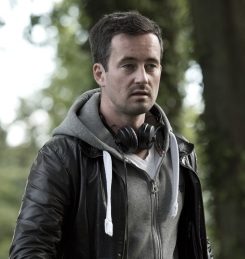 © Pandora Film
Christian Schwochow
© Pandora Film
Christian Schwochow grew up in Leipzig, East Berlin, and, since 1990, in Hannover. As a child, he appeared in East German Radio play productions. As a teenager, he became publisher and editor-in-chief of youth magazine Shot! After high school graduation in 1998, he worked as an author, speaker and reporter for various radio stations. From 2002 to 2008, Schwochow studied to become a film director, with an emphasis on feature films, at the Film Academy Baden-Württemberg. His graduate film was the feature,
Novemberkind (November Child). He wrote the screenplays for both
Marta and
Her Flying Grandfather and
November Child together with his mother, author and director Heide Schwochow. The two-part TV series
The Tower, adapted from Uwe Tellkamp’s novel of the same name, earned Christian Schwochow the 2013 Grimme-Prize. Christian Schwochow lives in Berlin.
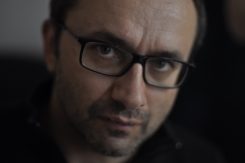 © Anna Matveeva
© Anna Matveeva
Born in Novosibirsk. In 1990,
Andrey Zvyagintsev graduated from the acting program at the Russian University of Theater Arts (GITIS), under the tutelage of Evgeny Lazarev. He went on to take part in independent theater productions and had a few bit parts in TV shows and movies. In 2000, he made his debut as a director.In 2003, Zvyagintsev shot his first feature film,
The Return, which became one of the cinema sensations of the year. A debut not only for the director but for the majority of the crew as well, it was accepted for the main competition at the Venice Film Festival, and won the Golden Lion. It also garnered the award for Best Debut. His second film,
The Banishment, was presented at the 60th Cannes Film Festival. The international premiere of Zvyagintsev’s third film,
Elena, took place in 2011 at the 64th Cannes Film Festival, where it was awarded the Special Jury Prize in the Un Certain Regard competition program.His most recent film,
Leviathan, screened in Official Competition at the 67th Cannes Film Festival and won the award for Best Screenplay.
Leviathan also became the first Russian film since 1969 to win a Golden Globe award and was nominated for the Best Foreign Film Academy Award ®.
For the complete schedule and film details, please visit: www.habitatinternationalfilmfestival.com
Festival passes will be available from the Festival website and the Programmes Desk, IHC, from
Tuesday, 6 March 2018 onwards.
Entry to the Festival is free.
Back